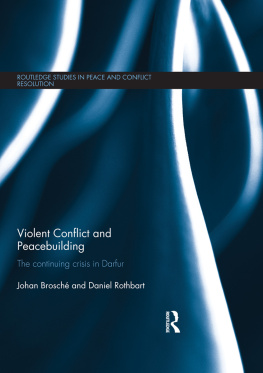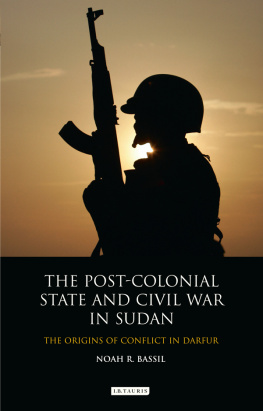Violent Conflict and Peacebuilding
This book examines the continuing devastation in the Darfur region of Sudan, focusing on its causes and consequences from the perspective of the complementarity of distinct conflicts.
The crisis reached its peak in 20032004, when certain Arab militias joined forces with the Sudan armed forces against insurgent resistance movements. Engulfed in the tumult, many Darfurians have experienced systematic slaughter, sexual violence, and internal displacement on a massive scale. Although the violence has waned in recent years, the fighting continues to this day. The authors cast this crisis as a complex web of four distinct, yet interlacing, conflict types:
Long-standing disputes between farmers and herders and between different herder communities |
Political struggles between the local elite leaders of the resistance movements, and those between traditional leaders (elders) and younger aspiring leaders |
Long-standing grievances of marginalized groups against those at the national center of power |
Cross-border conflicts, primarily the proxy war waged between Chad and Sudan. |
The crisis in South Sudan is also examined through the lens of conflict complementarity.
This book will be of interest to students of African politics, genocide, political violence, ethnic conflict, war and conflict studies, peacebuilding and international relations.
Johan Brosch is a PhD candidate at Uppsala University, Sweden.
Daniel Rothbart is Professor of Conflict Analysis and Resolution at the School of Conflict Analysis and Resolution, as well as Professor of Philosophy in the Department of Philosophy at George Mason University, VA.
Routledge Studies in Peace and Conflict Resolution
Series Editors: Tom Woodhouse and Oliver Ramsbotham
University of Bradford
Peace and Security in the Postmodern World
The OSCE and conflict resolution
Dennis J. D. Sandole
Truth Recovery and Justice after Conflict
Managing violent pasts
Marie Breen Smyth
Peace in International Relations
Oliver P. Richmond
Social Capital and Peace-Building
Creating and resolving conflict with trust and social networks
Edited by Michaelene Cox
Business, Conflict Resolution and Peacebuilding
Contributions from the private sector to address violent conflict
Derek Sweetman
Creativity and Conflict Resolution
Alternative pathways to peace
Tatsushi Arai
Climate Change and Armed Conflict
Hot and cold wars
James R. Lee
Transforming Violent Conflict
Radical disagreement, dialogue and survival
Oliver Ramsbotham
Governing Ethnic Conflict
Consociation, identity and the price of peace
Andrew Finlay
Political Discourse and Conflict Resolution
Debating peace in Northern Ireland
Edited by Katy Hayward and Catherine ODonnell
Economic Assistance and Conflict Transformation
Peacebuilding in Northern Ireland
Sean Byrne
Liberal Peacebuilding and Global Governance
Beyond the metropolis
David Roberts
A Post-Liberal Peace
Oliver P. Richmond
Peace Research
Theory and practice
Peter Wallensteen
Reconciliation after Terrorism
Strategy, possibility or absurdity?
Judith Renner and Alexander Spencer
Post-War Security Transitions
Participatory peacebuilding after asymmetric conflicts
Edited by Veronique Dudouet, Hans Giessman and Katrin Planta
Rethinking Peacebuilding
The quest for just peace in the Middle East and the Western Balkans
Edited by Karin Aggestam and Annika Bjrkdahl
Violent Conflict and Peacebuilding
The continuing crisis in Darfur
Johan Brosch and Daniel Rothbart
First published 2013
by Routledge
2 Park Square, Milton Park, Abingdon, Oxon OX14 4RN
Simultaneously published in the USA and Canada
by Routledge
711 Third Avenue, New York, NY 10017
Routledge is an imprint of the Taylor & Francis Group, an informa business
2013 Johan Brosch and Daniel Rothbart
The right of Johan Brosch and Daniel Rothbart to be identified as authors of this work has been asserted by them in accordance with sections 77 and 78 of the Copyright, Designs and Patents Act 1988.
All rights reserved. No part of this book may be reprinted or reproduced or utilized in any form or by any electronic, mechanical, or other means, now known or hereafter invented, including photocopying and recording, or in any information storage or retrieval system, without permission in writing from the publishers.
Trademark notice: Product or corporate names may be trademarks or registered trademarks, and are used only for identification and explanation without intent to infringe.
British Library Cataloguing in Publication Data
A catalogue record for this book is available from the British Library
Library of Congress Cataloging-in-Publication Data
Brosch, Johan.
Violent conflict and peacebuilding : the continuing crisis in Darfur /
Johan Brosch and Daniel Rothbart.
p. cm. (Routledge studies in peace and conflict resolution) Includes bibliographical references and index.
1. SudanHistoryDarfur Conflict, 2003 2. GenocideSudan Darfur. 3. Ethnic conflictSudanDarfur. 4. Peace-building SudanDarfur. 5. Darfur (Sudan)Ethinc relations. I. Rothbart, Daniel. II. Title.
DT159.6.D27B76 2012
962.4043092dc23
2012004150
ISBN: 978-0-415-68978-6 (hbk)
ISBN: 978-0-203-10485-9 (ebk)
ISBN: 978-1-136-25134-4 (epub)
Typeset in Baskerville
by Wearset Ltd, Boldon, Tyne and Wear
Foreword
The Darfur conflict in Sudan received considerable international attention during several years in the first decade of the twenty-first century. It had many of the hallmarks of ethnic conflicts in the Balkans and the Democratic Republic of Congo. Thus, international peacekeeping operations were launched in cooperation between the United Nations and the African Union. International mediators were appointed. The International Criminal Court became concerned. After this period of intense scrutiny, however, the Darfur situation was overshadowed by other global concerns: climate change, financial crises, dangers in Afghanistan and Pakistan, the rise of China, the Arab Spring and the independence of South Sudan. But the conflicts in Darfur lingered on. The lack of attention was not a sign of working solutions or positive developments. On the contrary, there were continued reasons for concern.
This is why this volume, Violent Conflict and Peacebuilding: The Continuing Crisis in Darfur, is a timely reminder of a large problematique the world has not followed as closely as it needs to. To enhance our understanding, the two authors of this book apply a framework of four increasingly complex levels. In this light it becomes obvious to the reader that the Darfur problem actually has to be understood as a set of conflicts on the communal level, as well as relations between local elites. Furthermore, there is a centerperiphery dimension that connects the distant Darfur to the centers of power and wealth in Sudan. Finally, there are the cross- border conflicts, making neighboring countries actors in Darfur and Sudan. In addition, the authors point to the interconnections among these levels. Thus, they work with a rich set of questions, and try to carefully respond to all of them. In particular, the authors do not end with just observing the intricacies of Sudan; they also bring in the possibilities of solutions. Again this is done by considering the four levels of conflict. Furthermore, the authors do not shy away from pointing out shortcomings of many of the efforts for peacebuilding and negotiation. In the end, however, they conclude that international efforts are indispensible if the Darfur conflicts are to be solved.





